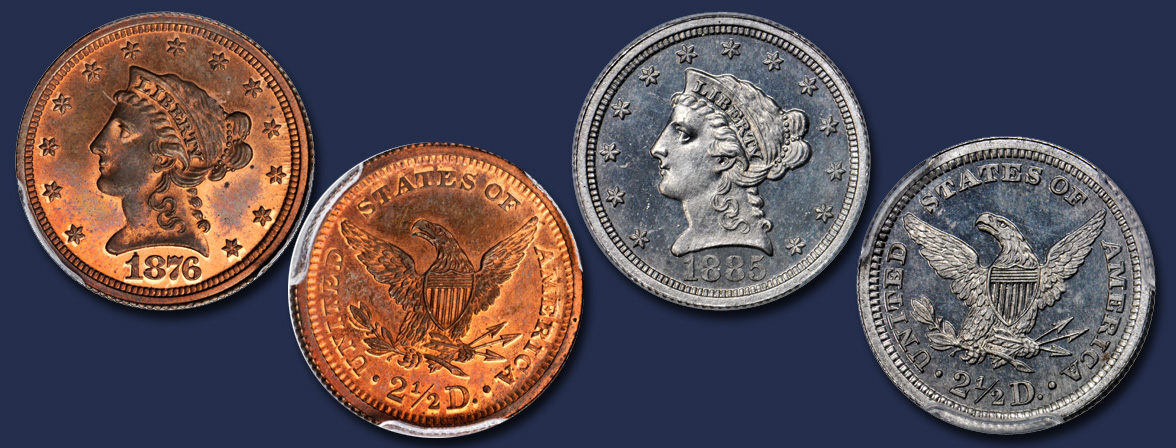
Consigned to our June Baltimore auction sale, as part of the Linnemann Family Collection, is a pair of extremely rare quarter eagle patterns, long held in this collection, and returning to the numismatic market after more than four decades in a bank vault. The Linnemann Collection provided a core group of rare and interesting pattern coins for the June sale, highlighted by a pair of Rarity-8 quarter eagle patterns.
The first is a 1876 Judd-1480, lot 2341, a copper striking from the normal Proof dies, graded Proof-64+ RB by PCGS, currently the finest certified RB example at PCGS (there is a Proof-65 BN on the Population Report), and one of three examples certified at both services combined. The last example to sell at public auction brought $5,750 in June 1998 (that example, certified as Proof-65 RB (NGC) at the time is now either the PCGS Proof-65 BN or the NGC Proof-64 RB). There was also an example (the www.uspatterns.com plate) that was offered in a July 2004 auction. Off the market since the 1960s, the example we will auction in June did not come with any prior pedigree information, and it would be interesting for next owner to trace its provenance.
The second coin, lot 2346, is one of only two known 1885 Judd-1752 quarter eagles struck in aluminum. It is the finest seen by PCGS, earning the Proof-65 Cameo grade. Only one other example is graded by the services, a PCGS coin that is a Proof-65 without the Cameo designation. Like the Judd-1480, the prior pedigree was not noted by the collector, but numismatic scholars may be able to ascertain whether or not this was the example sold by Sotheby’s in 1954 as part of the Palace Collection of King Farouk of Egypt. Knowing that the Linnemann Collection was assembled from 1955-1968, it is possible that this piece is the Farouk specimen. What makes this coin (currently the plate coin for www.uspatterns.com) interesting is that no example of this exceedingly rare coin has been sold at auction in generations.
Both these examples, long off the market, should create quite the stir when they cross the block next week in Baltimore. The opportunity to acquire either of these rare coins may not come again for quite some time (if ever). If patterns are your specialty, or if you just love extremely rare coins, be sure to be in attendance, either in person or online when these coins come up. We are conducting lot viewing in New York through Friday, June 14, and then in Baltimore next week. If you need more information about these or any other lots in the sale, do not hesitate to contact a staff member. If you are interested in consigning patterns or other rare U.S. coins, there is still time to consign to our official auction of the ANA’s World’s Fair of Money; consignments will be accepted through the end of the Baltimore convention.
The first is a 1876 Judd-1480, lot 2341, a copper striking from the normal Proof dies, graded Proof-64+ RB by PCGS, currently the finest certified RB example at PCGS (there is a Proof-65 BN on the Population Report), and one of three examples certified at both services combined. The last example to sell at public auction brought $5,750 in June 1998 (that example, certified as Proof-65 RB (NGC) at the time is now either the PCGS Proof-65 BN or the NGC Proof-64 RB). There was also an example (the www.uspatterns.com plate) that was offered in a July 2004 auction. Off the market since the 1960s, the example we will auction in June did not come with any prior pedigree information, and it would be interesting for next owner to trace its provenance.
The second coin, lot 2346, is one of only two known 1885 Judd-1752 quarter eagles struck in aluminum. It is the finest seen by PCGS, earning the Proof-65 Cameo grade. Only one other example is graded by the services, a PCGS coin that is a Proof-65 without the Cameo designation. Like the Judd-1480, the prior pedigree was not noted by the collector, but numismatic scholars may be able to ascertain whether or not this was the example sold by Sotheby’s in 1954 as part of the Palace Collection of King Farouk of Egypt. Knowing that the Linnemann Collection was assembled from 1955-1968, it is possible that this piece is the Farouk specimen. What makes this coin (currently the plate coin for www.uspatterns.com) interesting is that no example of this exceedingly rare coin has been sold at auction in generations.
Both these examples, long off the market, should create quite the stir when they cross the block next week in Baltimore. The opportunity to acquire either of these rare coins may not come again for quite some time (if ever). If patterns are your specialty, or if you just love extremely rare coins, be sure to be in attendance, either in person or online when these coins come up. We are conducting lot viewing in New York through Friday, June 14, and then in Baltimore next week. If you need more information about these or any other lots in the sale, do not hesitate to contact a staff member. If you are interested in consigning patterns or other rare U.S. coins, there is still time to consign to our official auction of the ANA’s World’s Fair of Money; consignments will be accepted through the end of the Baltimore convention.





